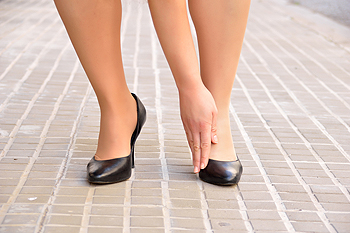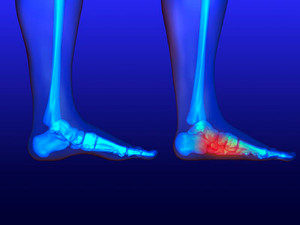Wesley Chapel
(813) 973-3535Call or Text
June 2021
Why Are High Heels Bad For My Feet?
 High heels are a popular choice for many people as they can make you look taller and make your legs appear longer, your feet smaller, and your body thinner. However, none of these perceived benefits are worth the damage to your feet and ankles that high heels can cause. Over time, wearing high heels can alter the muscle balance around the ankle joint, making the ankles weak and unstable, affecting your balance, and raising your risk of ankle sprains. The Achilles tendon may shorten and stiffen. In people who wear high heels often, the tendons can become so short and stiff that switching to flats causes calf pain. Even if you aren’t quite ready to give up your high heels, there are measures that you can take to prevent further damage and reduce your risk of injury. Look for high heels that are no taller than two inches and have thicker heels, alternate between high heels and flats often, wearing your high heels for no more than two or three days per week, and stretch your feet and ankles regularly. To learn more about the connection between footwear and foot health, please consult with a podiatrist.
High heels are a popular choice for many people as they can make you look taller and make your legs appear longer, your feet smaller, and your body thinner. However, none of these perceived benefits are worth the damage to your feet and ankles that high heels can cause. Over time, wearing high heels can alter the muscle balance around the ankle joint, making the ankles weak and unstable, affecting your balance, and raising your risk of ankle sprains. The Achilles tendon may shorten and stiffen. In people who wear high heels often, the tendons can become so short and stiff that switching to flats causes calf pain. Even if you aren’t quite ready to give up your high heels, there are measures that you can take to prevent further damage and reduce your risk of injury. Look for high heels that are no taller than two inches and have thicker heels, alternate between high heels and flats often, wearing your high heels for no more than two or three days per week, and stretch your feet and ankles regularly. To learn more about the connection between footwear and foot health, please consult with a podiatrist.
High heels have a history of causing foot and ankle problems. If you have any concerns about your feet or ankles, contact one of our podiatrists from New Tampa Foot & Ankle. Our doctors can provide the care you need to keep you pain-free and on your feet.
Effects of High Heels on the Feet
High heels are popular shoes among women because of their many styles and societal appeal. Despite this, high heels can still cause many health problems if worn too frequently.
Which Parts of My Body Will Be Affected by High Heels?
- Ankle Joints
- Achilles Tendon – May shorten and stiffen with prolonged wear
- Balls of the Feet
- Knees – Heels cause the knees to bend constantly, creating stress on them
- Back – They decrease the spine’s ability to absorb shock, which may lead to back pain. The vertebrae of the lower back may compress.
What Kinds of Foot Problems Can Develop from Wearing High Heels?
- Corns
- Calluses
- Hammertoe
- Bunions
- Morton’s Neuroma
- Plantar Fasciitis
How Can I Still Wear High Heels and Maintain Foot Health?
If you want to wear high heeled shoes, make sure that you are not wearing them every day, as this will help prevent long term physical problems. Try wearing thicker heels as opposed to stilettos to distribute weight more evenly across the feet. Always make sure you are wearing the proper shoes for the right occasion, such as sneakers for exercising. If you walk to work, try carrying your heels with you and changing into them once you arrive at work. Adding inserts to your heels can help cushion your feet and absorb shock. Full foot inserts or metatarsal pads are available.
If you have any questions please feel free to contact our office located in Wesley Chapel, FL . We offer the newest diagnostic and treatment technologies for all your foot and ankle needs.
What Is Anterior Ankle Impingement Syndrome?
 Anterior ankle impingement syndrome, also known as footballer’s ankle or athlete’s ankle, is an umbrella term used to describe soft tissue in the ankle getting pinched by bone. Tiny, repetitive traumas to the ankle, usually incurred while playing sports, leads the body to produce extra bone tissue in the area as a defense mechanism to prevent further injury. This can cause symptoms such as ankle pain, swelling, inflammation, a decreased range of motion, a loss of muscle strength, numbness in the toes, and a popping or crackling sound while walking or moving the affected ankle. These symptoms can interfere with participating in daily activities and require medical intervention to improve. If you suspect that you may have anterior ankle impingement syndrome, please consult with a podiatrist.
Anterior ankle impingement syndrome, also known as footballer’s ankle or athlete’s ankle, is an umbrella term used to describe soft tissue in the ankle getting pinched by bone. Tiny, repetitive traumas to the ankle, usually incurred while playing sports, leads the body to produce extra bone tissue in the area as a defense mechanism to prevent further injury. This can cause symptoms such as ankle pain, swelling, inflammation, a decreased range of motion, a loss of muscle strength, numbness in the toes, and a popping or crackling sound while walking or moving the affected ankle. These symptoms can interfere with participating in daily activities and require medical intervention to improve. If you suspect that you may have anterior ankle impingement syndrome, please consult with a podiatrist.
Sports related foot and ankle injuries require proper treatment before players can go back to their regular routines. For more information, contact one of our podiatrists of New Tampa Foot & Ankle. Our doctors can provide the care you need to keep you pain-free and on your feet.
Sports Related Foot and Ankle Injuries
Foot and ankle injuries are a common occurrence when it comes to athletes of any sport. While many athletes dismiss the initial aches and pains, the truth is that ignoring potential foot and ankle injuries can lead to serious problems. As athletes continue to place pressure and strain the area further, a mild injury can turn into something as serious as a rupture and may lead to a permanent disability. There are many factors that contribute to sports related foot and ankle injuries, which include failure to warm up properly, not providing support or wearing bad footwear. Common injuries and conditions athletes face, including:
- Plantar Fasciitis
- Plantar Fasciosis
- Achilles Tendinitis
- Achilles Tendon Rupture
- Ankle Sprains
Sports related injuries are commonly treated using the RICE method. This includes rest, applying ice to the injured area, compression and elevating the ankle. More serious sprains and injuries may require surgery, which could include arthroscopic and reconstructive surgery. Rehabilitation and therapy may also be required in order to get any recovering athlete to become fully functional again. Any unusual aches and pains an athlete sustains must be evaluated by a licensed, reputable medical professional.
If you have any questions please feel free to contact our office located in Wesley Chapel, FL . We offer the newest diagnostic and treatment technologies for all your foot and ankle needs.
Why Live with Pain and Numbness in Your Feet?
Could I Get Gout?
 Gout is a form of arthritis in which an overabundance of uric acid in the bloodstream leads to the formation of urea crystals in the joints, causing a painful gout flareup. These flare ups usually occur in the big toe joint and cause symptoms such as redness, swelling, warmth, and intense pain. While gout can affect anybody, certain people are more at risk of developing it than others. These include men, those who are obese, those who have hypertension, diabetes, or poor kidney function, and those who drink alcohol, sugary beverages, or consume a diet high in purines, which are found in red meat and certain types of seafood. Gout may flare up once or become a chronic condition. If you have had a gout flareup or are at risk for gout, please speak with a podiatrist.
Gout is a form of arthritis in which an overabundance of uric acid in the bloodstream leads to the formation of urea crystals in the joints, causing a painful gout flareup. These flare ups usually occur in the big toe joint and cause symptoms such as redness, swelling, warmth, and intense pain. While gout can affect anybody, certain people are more at risk of developing it than others. These include men, those who are obese, those who have hypertension, diabetes, or poor kidney function, and those who drink alcohol, sugary beverages, or consume a diet high in purines, which are found in red meat and certain types of seafood. Gout may flare up once or become a chronic condition. If you have had a gout flareup or are at risk for gout, please speak with a podiatrist.
Gout is a foot condition that requires certain treatment and care. If you are seeking treatment, contact one of our podiatrists from New Tampa Foot & Ankle. Our doctors will treat your foot and ankle needs.
What Is Gout?
Gout is a type of arthritis caused by a buildup of uric acid in the bloodstream. It often develops in the foot, especially the big toe area, although it can manifest in other parts of the body as well. Gout can make walking and standing very painful and is especially common in diabetics and the obese.
People typically get gout because of a poor diet. Genetic predisposition is also a factor. The children of parents who have had gout frequently have a chance of developing it themselves.
Gout can easily be identified by redness and inflammation of the big toe and the surrounding areas of the foot. Other symptoms include extreme fatigue, joint pain, and running high fevers. Sometimes corticosteroid drugs can be prescribed to treat gout, but the best way to combat this disease is to get more exercise and eat a better diet.
If you have any questions please feel free to contact our office located in Wesley Chapel, FL . We offer the newest diagnostic and treatment technologies for all your foot and ankle needs.
Arthritis and Joint Foot Pain
Arthritis is a common medical condition worldwide, and can cause severe pain and discomfort. When it occurs in the feet, it may be difficult to walk, in addition to completing daily activities. There are several different forms of arthritis, and gout generally affects the joints in the big toe. Lupus can affect the joints in the feet, and arthritis can gradually develop. Many patients find it is beneficial to take specific medications that may help with the inflammation arthritis can cause. If you have joint pain in your feet, it is strongly suggested that you are under the care of a podiatrist who can help you to manage this condition.
Arthritis can be a difficult condition to live with. If you are seeking treatment, contact one of our podiatrists from New Tampa Foot & Ankle. Our doctors can provide the care you need to keep you pain-free and on your feet.
Arthritic Foot Care
Arthritis is a joint disorder that involves the inflammation of different joints in your body, such as those in your feet. Arthritis is often caused by a degenerative joint disease and causes mild to severe pain in all affected areas. In addition to this, swelling and stiffness in the affected joints can also be a common symptom of arthritis.
In many cases, wearing ill-fitting shoes can worsen the effects and pain of arthritis. Wearing shoes that have a lower heel and extra room can help your feet feel more comfortable. In cases of rheumatoid arthritis, the arch in your foot may become problematic. Buying shoes with proper arch support that contour to your feet can help immensely.
Alleviating Arthritic Pain
- Exercises that stretch the foot can prevent further pain and injury and increase mobility
- Most of the pain can be alleviated with anti-inflammatory drugs, heat, and topical medications
- Massages can help temporarily alleviate pain.
It is best to see your doctor for the treatment that is right for your needs and symptoms. Conditions vary, and a podiatrist can help you determine the right method of care for your feet.
If you have any questions, please feel free to contact our office located in Wesley Chapel, FL . We offer the newest diagnostic tools and technology to treat your foot and ankle needs.
Plantar Warts Can Be Treated!
Supportive Shoes May Help Flat Feet
 The condition that is known as flat feet may cause pain and discomfort in many patients. It is defined as a foot structure abnormality, and is noticeable as the foot lies completely flat while standing on the floor. Research has indicated the muscles and ligaments can become strained, and may cause pain while walking. It can become more prevalent in people who are obese, have high blood pressure, or are diabetic. Patients who find their feet ache as a result of flat feet may find mild relief when supportive shoes are worn. If you have this condition, it is suggested that you seek the professional advice of a podiatrist who can choose the proper treatment for flat feet.
The condition that is known as flat feet may cause pain and discomfort in many patients. It is defined as a foot structure abnormality, and is noticeable as the foot lies completely flat while standing on the floor. Research has indicated the muscles and ligaments can become strained, and may cause pain while walking. It can become more prevalent in people who are obese, have high blood pressure, or are diabetic. Patients who find their feet ache as a result of flat feet may find mild relief when supportive shoes are worn. If you have this condition, it is suggested that you seek the professional advice of a podiatrist who can choose the proper treatment for flat feet.
Flatfoot is a condition many people suffer from. If you have flat feet, contact one of our podiatrists from New Tampa Foot & Ankle. Our doctors will treat your foot and ankle needs.
What Are Flat Feet?
Flatfoot is a condition in which the arch of the foot is depressed and the sole of the foot is almost completely in contact with the ground. About 20-30% of the population generally has flat feet because their arches never formed during growth.
Conditions & Problems:
Having flat feet makes it difficult to run or walk because of the stress placed on the ankles.
Alignment – The general alignment of your legs can be disrupted, because the ankles move inward which can cause major discomfort.
Knees – If you have complications with your knees, flat feet can be a contributor to arthritis in that area.
Symptoms
- Pain around the heel or arch area
- Trouble standing on the tip toe
- Swelling around the inside of the ankle
- Flat look to one or both feet
- Having your shoes feel uneven when worn
Treatment
If you are experiencing pain and stress on the foot you may weaken the posterior tibial tendon, which runs around the inside of the ankle.
If you have any questions please feel free to contact our office located in Wesley Chapel, FL . We offer the newest diagnostic and treatment technologies for all your foot and ankle needs.













